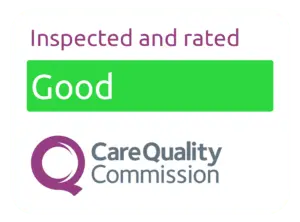What Is PCOS and How Does It Affect Your Weight?
Let’s shed some light on the commonly asked question: What is PCOS? PCOS (Polycystic Ovarian Syndrome) is a complex hormonal condition believed to affect one in every eight women in the UK. It is characterised by:
- Irregular periods
- Difficulties conceiving
- Weight gain and difficulty losing weight
Polycystic ovaries tend to be larger than normal ovaries and have significantly more follicles. Follicles are small fluid-filled sacs which release eggs when a woman is ovulating.
What are the causes of PCOS?
The causes of PCOS are unknown but it is believed that several factors are involved. Some studies have shown that there is a genetic component, with women who have a history of PCOS in their family being at higher risk of developing the condition.
While the causes behind the condition remain unidentified, the reasons for the symptoms that many women experience are well understood and are related to abnormal hormone levels. These include:
- Increased insulin resistance
- Increased levels of testosterone
What are the symptoms of PCOS?
The most-common symptoms of PCOS include:
- Irregular or absent periods
- Oily skin
- Acne
- Loss of hair on the head
- Increase in facial hair growth
- Weight gain and difficulty losing weight
- Low mood and depression
What are the long-term health effects of PCOS?
As PCOS is associated with increased insulin resistance, women who suffer with the condition are at a greater risk of developing type-2 diabetes (try our type-2 diabetes checker). There is also a greater risk of developing gestational diabetes, which is diabetes developed during pregnancy.
PCOS is also associated with obesity, which in itself carries several health risks, including:
- heart disease
- bone and joint disorders
- increased risk of certain cancers
- high blood pressure
- type-2 diabetes
- raised cholesterol
- sleep apnoea
- depression
- reduced quality of life
Why is weight loss so difficult with PCOS?
The effects on women’s weight are believed to be caused by insulin resistance. Insulin is a hormone the body produces to regulate blood sugar. Insulin resistance occurs when the body either stops responding to its own insulin or responds poorly. When this occurs, the body’s response is to produce more insulin, leading to abnormally high levels of insulin in the blood. This in turn leads to increased appetite, increased fat storage and decreased fat breakdown.
Many women who struggle with PCOS and weight loss find themselves caught between a rock and a hard place, as the most effective way to improve insulin resistance is to lose weight but the hormonal dysfunction that underlies PCOS means that weight loss is much more difficult than in overweight patients who do not suffer with PCOS.
Does that mean I can’t lose weight with PCOS?
Thankfully the answer is no, it is not impossible to lose weight with PCOS but it requires careful guidance and a robust plan to tackle it. Weight loss is highly desirable in women with PCOS as it has been shown to improve fertility, improve menstrual cycle dysfunction and greatly reduces the risk of developing many of the health conditions associated with being overweight.
What dietary changes do I need to make to manage PCOS weight gain?
With insulin resistance being at the heart of PCOS weight gain, eating a healthy, balanced diet which includes lean protein, fruit and vegetables is essential. It is also imperative that you avoid processed foods, which in themselves are believed to be a central cause of rising obesity levels in the Western world. Our expert dietitians can provide you with additional guidance on healthy eating.
How can Wegovy/Mounjaro help me lose weight?
Wegovy and Mounjaro are from a class of medications known as glucagon-like peptide-1 (GLP-1) receptor agonists. These novel medications have been shown to influence appetite-regulating hormones, which leads to a reduction in appetite and feeling fuller for longer owing to the fact that they slow how quickly food passes through the digestive system.
Many people are aware of the need to consume a balanced diet, however, the reality is that it is easier said than done and this is where the true value of Wegovy and Mounjaro are found. Long-term weight loss requires long-term thinking and the real strength of these medications is that they help you make the changes necessary to maintain weight loss once a healthy weight has been achieved. The real value of Wegovy and Mounjaro is found in the help they provide in helping people build a structure that will serve them going forward, making it much easier for people to instigate behavioural change and it is this behavioural change that will provide the bedrock for long-term success.
An added benefit for women with PCOS is that Wegovy and Mounjaro have been shown in clinical trials to improve insulin sensitivity, making them an even more effective choice in treating obesity associated with the condition.

Written by:
Dr Daniel Ohio MBBS
Dr Daniel Ohio has been a Consulting Doctor at The Slimming Clinic for 5 years.
M BS 2016 University of Limerick
GMC Number: 7598329

Cycle to Work Day - Benefits of Cycling for Your Health, Weight and...

How Friends and Family Can Help With Weight Loss

National Technology Day: Top 10 Weight Loss Tools to Try in 2025

Plant-Based Diet: Easy Vegan Swaps for a Healthier Lifestyle

National Tea Day: Herbal Tea For Weight Loss




